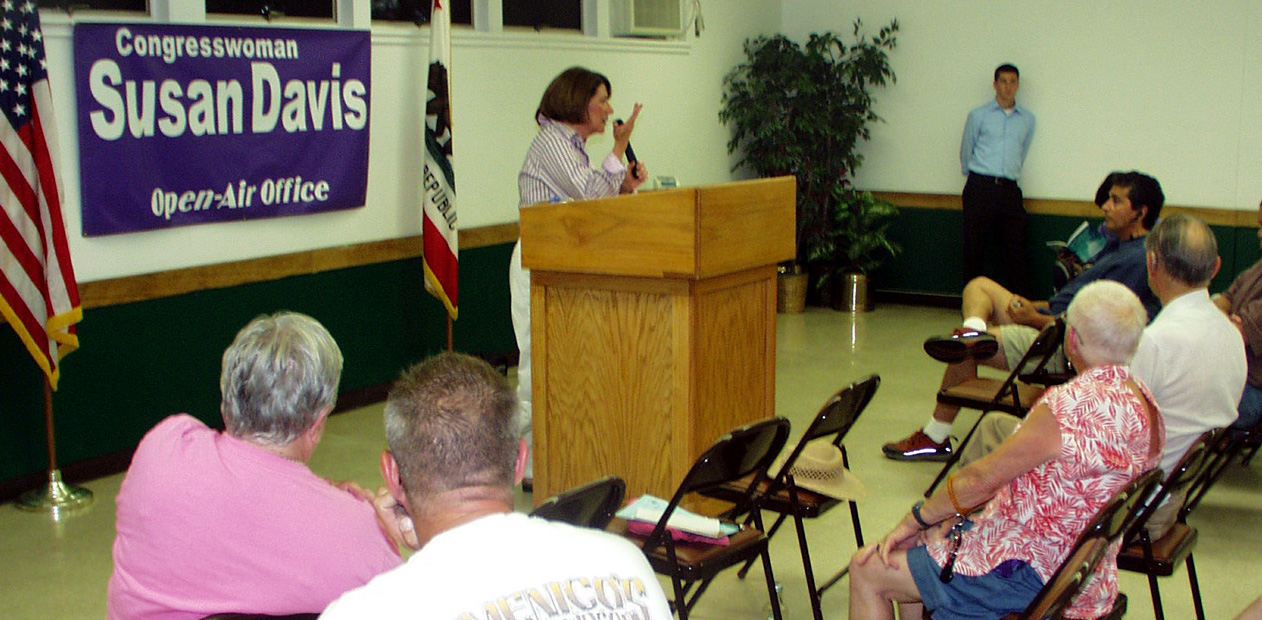
By Donald H. Harrison
SAN DIEGO, Calif. —If the visit of U.S. Rep. Susan Davis (D-San
Diego) back to her home district is typical, then the vocal members of her
constituency—and those of other members of Congress— want their elective
representatives to lower taxes, figure out what to do about the war in
Iraq, get a handle on rising health care costs, and stop illegal
immigration
 Of
course, there are other issues that the constituents also care deeply
about, but those four occupied most of the discussion time during Davis'
advertised weekend visit to the Kearny Mesa Park and Recreation Center, across
the street from San Diego's National Guard Armory.
Of
course, there are other issues that the constituents also care deeply
about, but those four occupied most of the discussion time during Davis'
advertised weekend visit to the Kearny Mesa Park and Recreation Center, across
the street from San Diego's National Guard Armory.
About two dozen constituents in folding chairs listened, and occasionally
agreed or contradicted, as Davis, a three-term Congresswoman and member
of the Jewish community, set forth her views on these subjects.
The discussion on taxes focused on one particularly insistent questioner's
views that the estate tax ought to be repealed. Davis resisted this, saying
the tax falls on only .15 percent of the taxpayers in the United States but
raises over $760 billion. Repealing the tax, which only affects couples
receiving more than $10 million in inheritance, would place an unfair burden
on the rest of the taxpayers who would have to make up the loss of $760
billion in revenue.
A woman sitting in the back row, who may have been a multi-millionaire in
middle class disguise, complained that "we're taxed, taxed and
re-taxed." Responded Davis, "I appreciate that , but what I am
trying to understand is whether people think it is okay for the top .15
percent of the taxpayers in this country to put a burden of $760 billion on
the rest of us."
The conversation transitioned to what high taxes support—the war in
Iraq—and what they don't—lowering the cost of medical care.
On Iraq, Davis pointed out that she voted against the original resolution
authorizing the war in Iraq. "I did not think we exhausted the
initial diplomatic options, and we did not have an exit plan," she
stated. As a member of the House Armed Services Committee, she added,
"I listened to (Defense Secretary Donald) Rumsfeld and company, and it
was clear there really wasn't anything other than they thought we were going
to be greeted with roses. There was no plan how we would extricate
ourselves."
The congresswoman said that like everyone else in the room, she is
"a big supporter of our troops...but what concerns me is that our troops
have been used in a variety of ways that they really haven't had an
opportunity to train for, nor is it their role. We were so poorly
equipped and so poorly prepared, not just in armor, but in our diplomatic
outreach and ability to go into the country and to work with local
individuals," she said.
"We are using our military today to play those roles to help develop the
local governments, but they are put in a situation where one minute they are
put into a room and talking and the next minute they are trying to quell a
disturbance outside and that is a very difficult role to play, especially when
you are not even sure who your enemy is."
She said a plan needs to be developed to bring American troops home as early
as possible, but added that she does not favor announcing a date certain by
which the U.S. military would leave Iraq. Making it clear that U.S.
military support for Iraq will not last forever, she said, may put pressure on
the new government of Iraq to do more to quell the disturbances, including
working with neighboring Arab countries on methods to pacify the region.
Arab countries would not consider sending their troops into Iraq while U.S.
forces are there, she said.
In the meantime, she suggested, "maybe we can remove our troops from some
of the key areas so that they are not beyond the horizon but they are not
within the center of the activity. We certainly don't want them to be
the source of continual conflict and violence in Iraq."
As for rising health costs, Davis—whose husband Steve is a medical
doctor—said that they are attributable to a variety of causes. In some
cases, she said, the increases are a result of better health care—"some
of that is for technology, for MRI's, and certain drugs play a role in
it." Other costs result from health risks that some Americans
inflict upon themselves, such as smoking and obesity. Another problem,
she suggested, are "the middle men in this country. We have HMO's,
we have medical health care companies that take a large percentage of that in
order to manage our affairs....Upward of 30 percent or more of health care
dollars don't necessarily go to the health care provider or to the
patient."
Davis said in the six years that she has been a member of Congress, the
Republican leadership has not permitted any legislation that would seriously
reform the health care delivery system to come to the House floor.
"I think that issues that really matter to the American people have been
put on the shelf, while we have dealt with other issues that have not been as
critical to every American."
The hot button issue in this border city forum was immigration—a subject
which fills the many hours of talk radio with which San Diego is
bombarded. Although the issue is divisive, suggested Davis, there are
perhaps four statements with which most people would agree. First, that
the borders must be closed to terrorists. Second, American businesses
need to be able to find people who can take fill their jobs. Third, we need
more Border Agents. Fourth, some way should be found to allow immigrants
to earn their way into this country.
 There
was a murmur from the audience on the latter point, suggesting consensus on
that point will be difficult to achieve. "I'm not for
amnesty," Davis said. "But if you have a system where people
have to demonstrate that in many cases they have been paying their taxes, and
contributing to the community, and have been working to set up businesses, a
whole host of things, then I think after a period of years, background checks,
fines, speaking English, what have you, I would hope that there might be a
comprehensive approach that we might agree on."
There
was a murmur from the audience on the latter point, suggesting consensus on
that point will be difficult to achieve. "I'm not for
amnesty," Davis said. "But if you have a system where people
have to demonstrate that in many cases they have been paying their taxes, and
contributing to the community, and have been working to set up businesses, a
whole host of things, then I think after a period of years, background checks,
fines, speaking English, what have you, I would hope that there might be a
comprehensive approach that we might agree on."
Tank at National Guard Armory in Kearny Mesa
In the meantime, she said, the number of Border Guards have to be increased,
sanctions need to be leveled against major employers who get rich exploiting
low-wage-earning immigrants, and equipment promised for border control needs
to be delivered and put in working order. As for proposals to
place the National Guard on the border, Davis said she does not believe this
should be done wholesale, as National Guard units may be required in other
parts of the state at a moment's notice. But here and there, she said,
especially for technical support—as opposed to patrolling the border—she
thinks some National Guard involvement may be an appropriate option.

